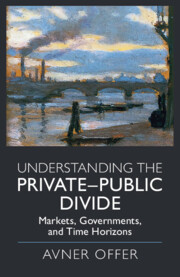Book contents
- Understanding the Private–Public Divide
- Understanding the Private–Public Divide
- Copyright page
- Dedication
- Contents
- Figures
- Tables
- Preface
- Abbreviations
- Introduction
- Chapter 1 Patient Capital
- Chapter 2 Corruption and Integrity
- Chapter 3 Plutocratic Blowback
- Chapter 4 Creating Humans
- Chapter 5 Exit from Work
- Chapter 6 Housing and Democracy
- Chapter 7 Climate Change and Time Horizons
- Conclusion
- References
- Index
Introduction
Published online by Cambridge University Press: 14 April 2022
- Understanding the Private–Public Divide
- Understanding the Private–Public Divide
- Copyright page
- Dedication
- Contents
- Figures
- Tables
- Preface
- Abbreviations
- Introduction
- Chapter 1 Patient Capital
- Chapter 2 Corruption and Integrity
- Chapter 3 Plutocratic Blowback
- Chapter 4 Creating Humans
- Chapter 5 Exit from Work
- Chapter 6 Housing and Democracy
- Chapter 7 Climate Change and Time Horizons
- Conclusion
- References
- Index
Summary
Economics takes the view from the present. But as people become affluent, they care more for the future, which is what government provides for. In the twentieth century, government has grown faster than the economy, and even Conservative governments have failed to wind it down. The reason is that markets take the short view and cannot provide for the future on their own. Before the nineteenth century, interest was seen as usury, rent as parasitical, and profit as exploitation. In response, the neoclassical economics of the 1870s came to the defence of privilege: property was legitimate, interest and profit were the cost of patience, the reward for capitalist energy and enterprise. Markets were the natural order, government and taxes parasitical. Since the 1980s governments have embraced markets as enterprising, innovative, efficient, superior. But privatisation, deregulation, and outsourcing have not fulfilled their promise. Government has not gone away. An outline of the book concludes.
Keywords
Information
- Type
- Chapter
- Information
- Understanding the Private–Public DivideMarkets, Governments, and Time Horizons, pp. 1 - 10Publisher: Cambridge University PressPrint publication year: 2022
